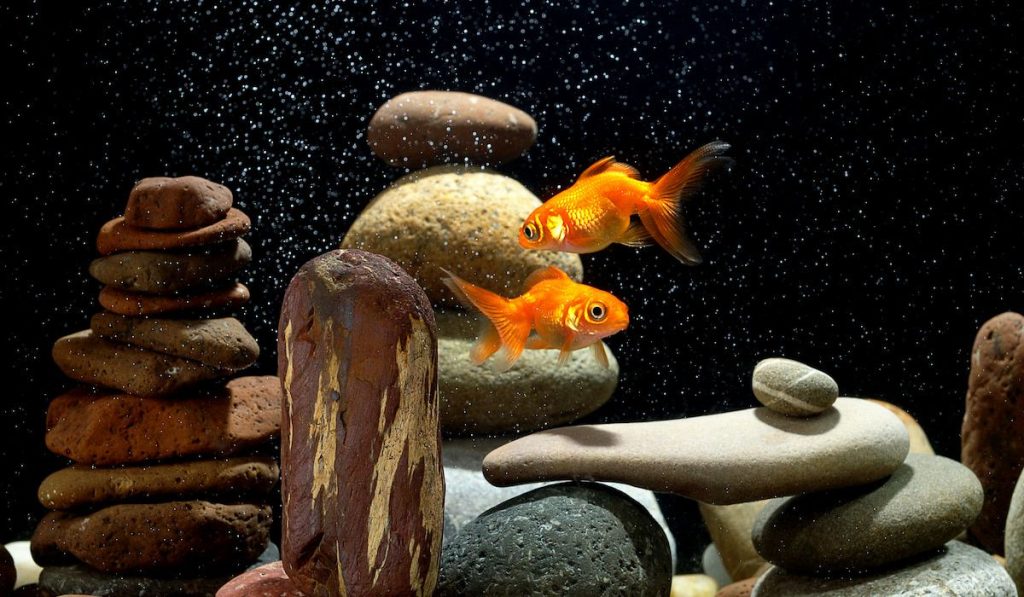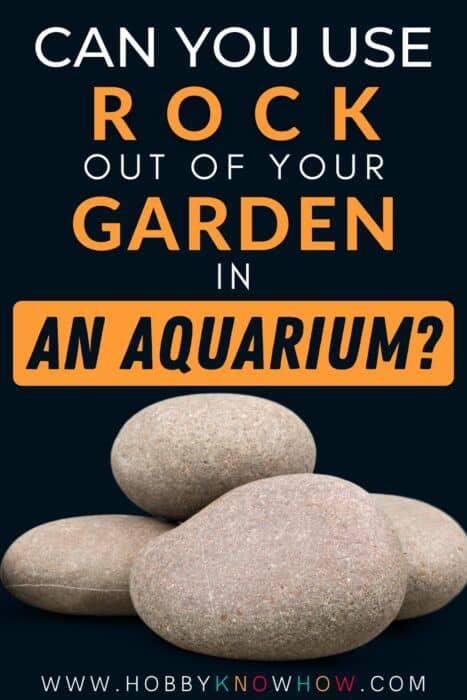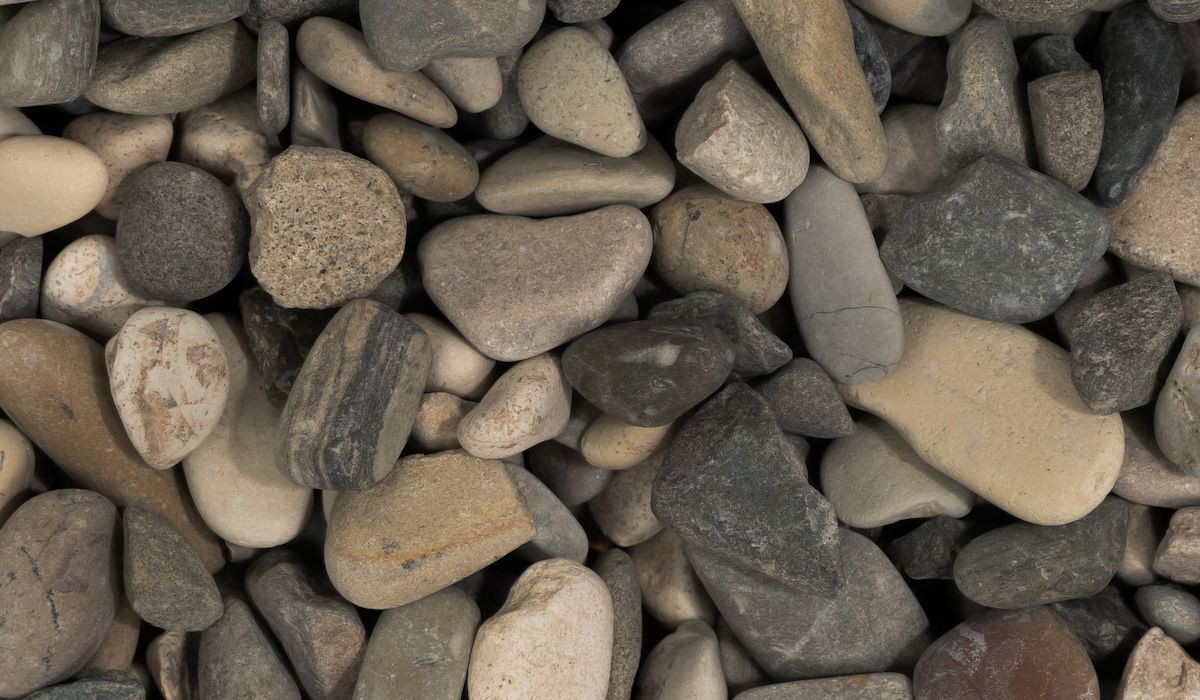Using rocks out of your garden is a cheaper option; however, it’s risky since there’s a lot that could go wrong. The stones can affect the water quality or contaminate the tank.
But on the other hand, using the right tests, you may be able to eliminate the bad rocks.
So how do you know which rocks are good and which ones to avoid? Should you pick rocks instead of buying? Let’s talk more about your aquarium rocks.
Which Rocks Are Safe For The Aquarium?
Rocks affect the water’s pH, so it’s best to avoid those that are high in calcium for freshwater tanks. They harden the water and make it alkaline, for example, stones like marble and limestone.
On the other hand, saltwater tanks need a higher PH. Therefore, they need these alkaline high, calcium rocks.
You can choose rocks like Ohio dragon stone, black lava rocks, or slate rock for aquariums. These won’t affect the pH of the water.
In most cases, granite is a universal rock that you can use in both freshwater and saltwater aquariums.
These rocks are readily available; you can buy them from most places.
Here are some rocks that you should avoid:
- Limestone
- Marble
- Dolomite
How Can I Tell If A Rock Is Safe?
The best way to determine if rocks are safe is to test them for pH. The first step is to thoroughly wash the rocks to eliminate any mud and grit on the surface.
Just be careful not to clean with soap or detergent since this may alter the pH. Once the rock is clean, there’s are a few tests you can do.
Acid test
The first test is as simple as putting a few drops of vinegar on the rock.
If the vinegar fizzes, it means the stone has too much calcium, and you should avoid it.
The test sounds simple enough, but it’s based on actual chemistry.
The vinegar is an acid and will react with the alkaline calcium; that’s why it bubbles.
Any acid will do for this test; some recommend using a stronger acid like hydrochloric acid – but what are the odds that you just have some hydrochloric acid lying around?
Water test
The second involves putting the clean rocks in the water, letting them sit for a while, and then testing the water’s pH.
After about a week, retest the pH. If the water’s pH goes any higher within the week, the rocks are not suitable for your tank.
All the pH stuff may be too technical, but don’t let it confuse you; remember the key takeaways:
- Pour vinegar and see it sputters
- Leave the rocks in the water and see if the pH increases.
Should I Pick Rocks Outdoors?
Picking rocks in your garden should be fine as long as you follow some guidelines, including;
- Avoid rocks with sharp edges; they can be very dangerous for your fish. Go for smooth stones instead. Besides being safer, you’ll have fewer problems with algae collecting in hard-to-reach places on the rock.
Find rocks in habitats that fish naturally thrive, such as beaches, along streams, and in dry wash beds.

Just be careful not to disturb habitats that plants and aquatic animals depend on.
It’s also a good idea not to pick the rocks directly from the water to avoid carrying any bacteria with them.
- Test the rock’s pH. Never assume that all the stones will have the same pH because you’re picking them from the same place.
- Avoid areas with possible contamination like highly polluted areas or places with a lot of fertilizer. It may not be possible to remove all the toxins from the rocks, and you could accidentally put your fish in harm’s way.
- Don’t pick any rocks that crumble. The fish may accidentally swallow the bits, and they may make it difficult to clean your tank.
- Inspect the rocks for any traces of metal or rust. That’s because metal poisoning may be deadly for your fish.

Can I Make Outdoor Rocks Safe For The Aquarium?
Considering using outdoor stones? That’s understandable, especially If you’re working on a tight budget, with all the other equipment so expensive.
But you have to take great pains to make them safe for the aquarium.
There are two common methods for making rocks safe.
Boiling rocks
Place the rocks in a large covered pot and bring up to a stable boil. Make sure the stones are fully submerged and boil for 30 minutes.
Then allow it to cool off completely before using it in the aquarium. This helps to kill any contaminants on the rock.
You need to be very careful if you decide to do this. Don’t boil the rocks for too long since they might explode.
It’s also a good idea to wear protective clothing. And be warned that rocks get extremely hot when boiled and take a long time to cool, so be cautious not to burn yourself.
Disinfect
You can also submerge the rocks in a dilute bleach solution (10:1). Let them sit for a day or two. Then take them out and wash thoroughly.
Allow the rocks to stand in clean water for another day or two, and then rewash them. You can repeat this cleaning process for a few days (about a week).
You may have noticed that these methods do nothing about the calcium content of the rock.
So in effect, if a stone has a high calcium content, there’s nothing you can do to make it safe for the aquarium.
Final thought
Using outdoor rocks is risky but not entirely off-limits. If you select your rocks from the right places, check their pH and purify them to eliminate bacteria, they should be perfectly safe. However, it’s always safer to buy aquarium-ready rocks from the store.




